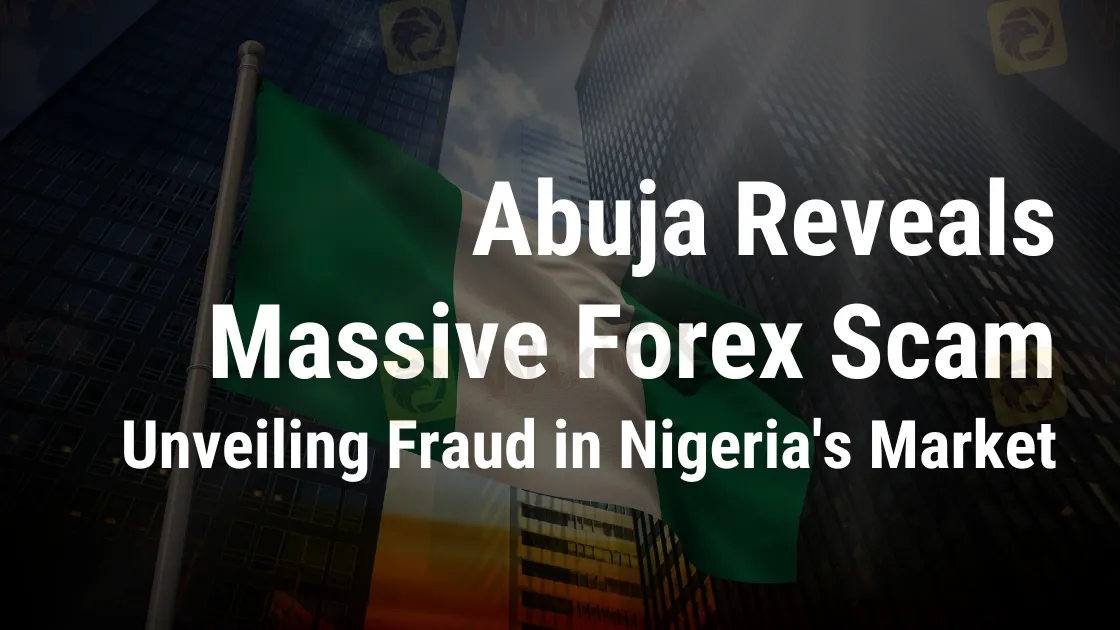简体中文
繁體中文
English
Pусский
日本語
ภาษาไทย
Tiếng Việt
Bahasa Indonesia
Español
हिन्दी
Filippiiniläinen
Français
Deutsch
Português
Türkçe
한국어
العربية
Abuja Reveals Massive Forex Scam: Unveiling Fraud in Nigeria's Market
Abstract:Abuja uncovers a significant forex scam, exposing fraud in Nigeria's market. EFCC's probe reveals a cunning plan swindling billions, prompting govt action.

Nigeria's foreign exchange industry was shaken by a massive forex scam revealed in Abuja. EFCC found a fraudulent plan that swindled an inexperienced investor out of over a billion Naira, illustrating the sector's persistent fraud issue. December 2023's event highlighted foreign currency transaction risks and prompted a government response to calm markets.
A victim was duped into depositing ₦1.02 billion for what was purported to be its dollar equivalent, exposing the deception. The purchase was facilitated by a trustworthy merchant, but it was a cunning fraud. The investor was left empty-handed, with just forged proof of dollar payment as proof of the deal. This complex scheme demonstrates the extent fraudsters would go to abuse the foreign exchange market, resulting in enormous financial losses for the victims.
The EFCC's probe into the scheme uncovered the suspect's lavish spending on illegal proceeds. Funds were transferred to acquire property and expensive vehicles, including three 18-seater Toyota Hiace buses and four exotic automobiles, purportedly for an aviation services firm. This instance is a sharp reminder of the fraudulent practices that plague Nigeria's foreign exchange industry, stressing the need for investor caution.

The consequences of this fraud have far-reaching repercussions for Nigeria's foreign currency market. Recognizing the potential disruptive impact of such fraudulent operations, the government has formed a joint task force, which includes the EFCC, to confront the problem. This task team intends to reduce speculation and stabilize the Naira, which has witnessed currency volatility versus the US dollar. Efforts to combat unlawful forex transactions, particularly in Abuja, indicate the government's commitment to ensuring economic stability.
These initiatives, however, highlight the difficulties in preventing fraud and providing a safe environment for investors. The occurrence calls into question the efficacy of regulatory regimes in avoiding fraud and safeguarding the interests of foreign currency market participants. As the government and regulatory authorities work to stabilize the market and prevent future fraud, the effect of such schemes on investor trust and market stability remains a source of worry.
Finally, the unearthing of the billion Naira currency fraud in Abuja has highlighted the flaws in Nigeria's foreign exchange sector. It focuses on the complex tactics used by scammers to deceive investors, as well as the government and regulatory bodies' subsequent attempts to solve these issues. As Nigeria grapples with the challenges of maintaining a stable and secure financial industry, this episode serves as a warning tale for investors and a call to action for regulators to strengthen fraud measures.

Disclaimer:
The views in this article only represent the author's personal views, and do not constitute investment advice on this platform. This platform does not guarantee the accuracy, completeness and timeliness of the information in the article, and will not be liable for any loss caused by the use of or reliance on the information in the article.
Read more

Top 10 Trading Indicators Every Forex Trader Should Know
Master the top 10 Forex trading indicators to analyze real-time Forex quotes, trends, and market signals. Learn strategies to boost accuracy and avoid mistakes.

Malaysian Influencer Detained in Taiwan Over Alleged Role in Fraud Scheme
Malaysian influencer Hu Chang Mun, widely known as Ady Hu, has been detained in Taiwan for his alleged involvement in a fraudulent operation. The 31-year-old, who was reported missing earlier in December, was located by Taiwanese authorities after suspicions arose regarding his activities.

WikiEXPO Global Expert Interview: Simone Martin—— Exploring Financial Regulation Change
In the midst of financial innovation and regulation, WikiGlobal, the organizer of WikiEXPO, stays abreast of industry trends and conducts a series of insightful and distinctive interviews on pivotal topics. We are delighted to have the privilege of inviting Simone Martin for an in-depth conversation this time.

MultiBank Group Wins Big at Traders Fair Hong Kong 2024
Discover how MultiBank Group, a global leader in financial derivatives, secured three prestigious awards at Traders Fair Hong Kong 2024, highlighting its innovative trading solutions and industry excellence.
WikiFX Broker
Latest News
Geopolitical Events: What They Are & Their Impact?
Volkswagen agrees deal to avoid Germany plant closures
Top 10 Trading Indicators Every Forex Trader Should Know
TradingView Launches Liquidity Analysis Tool DEX Screener
MultiBank Group Wins Big at Traders Fair Hong Kong 2024
WikiEXPO Global Expert Interview: Simone Martin—— Exploring Financial Regulation Change
'Young investors make investment decisions impulsively to keep up with current trends' FCA Reveals
Why Do You Feel Scared During Trade Execution?
CySEC Settles Compliance Case with Fxview Operator Charlgate Ltd
Malaysian Influencer Detained in Taiwan Over Alleged Role in Fraud Scheme
Currency Calculator


